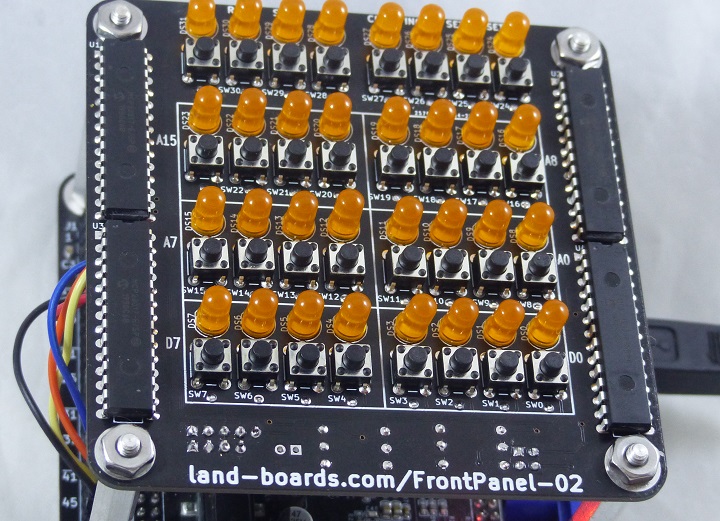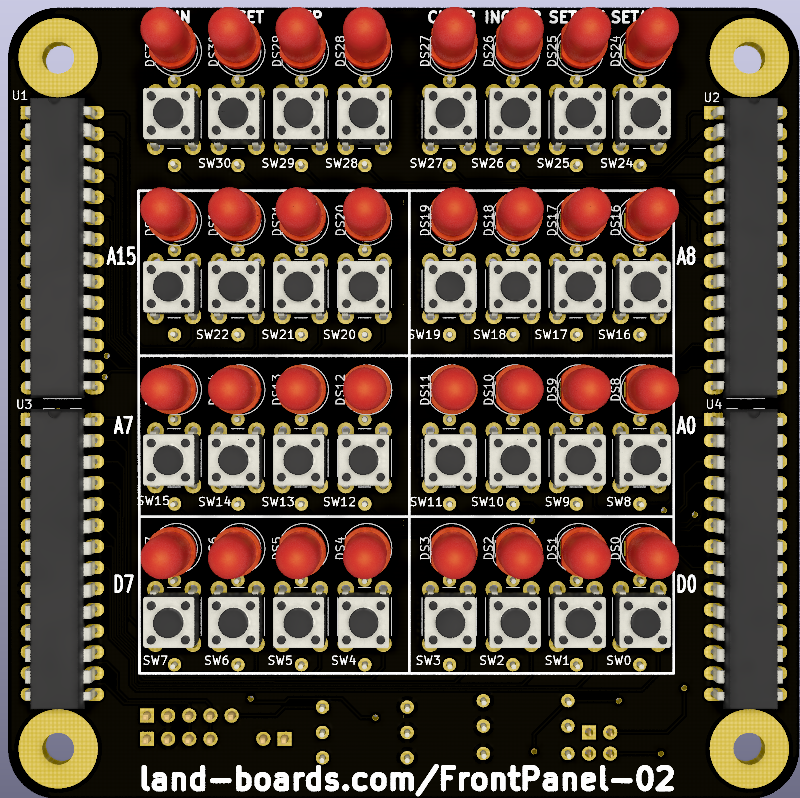Difference between revisions of "Front Panel for 8 Bit Computers V2"
Jump to navigation
Jump to search
Blwikiadmin (talk | contribs) |
Blwikiadmin (talk | contribs) |
||
| (6 intermediate revisions by the same user not shown) | |||
| Line 26: | Line 26: | ||
*** [https://ww1.microchip.com/downloads/en/devicedoc/20001952c.pdf MCP23017] need to be set to Open-Drain output - card has pull-up to Vcc | *** [https://ww1.microchip.com/downloads/en/devicedoc/20001952c.pdf MCP23017] need to be set to Open-Drain output - card has pull-up to Vcc | ||
* 4 of [https://ww1.microchip.com/downloads/en/devicedoc/20001952c.pdf MCP23017] 16-bit I2C Port Expanders | * 4 of [https://ww1.microchip.com/downloads/en/devicedoc/20001952c.pdf MCP23017] 16-bit I2C Port Expanders | ||
| + | ** [https://ww1.microchip.com/downloads/aemDocuments/documents/APID/ProductDocuments/DataSheets/MCP23017-Data-Sheet-DS20001952.pdf MCP23017 Datasheet] - Rev D | ||
| + | ** [https://hackaday.com/2023/02/03/mcp23017-went-through-shortage-hell-lost-two-inputs/?fbclid=IwAR1ktG1CsU7ns5fmTYXdlpBLdqaJmBioXrVrG1_Lgqe8MTQr1AY4rp6IETU MCP23017... LOST TWO INPUTS] | ||
| + | *** MCP23017 now a 14/16-bit expander, with two of the pins (GPA7 and GPB7) losing their input capabilities | ||
| + | *** The chips look the same, are called the same, and act mostly the same — if you don’t download the latest version of the datasheet (Revision D), you’d never know that there’s been a change | ||
** These are fine pitch surface mount parts | ** These are fine pitch surface mount parts | ||
* 3.3V or 5V operation | * 3.3V or 5V operation | ||
| Line 92: | Line 96: | ||
*** [https://github.com/douggilliland/Design_A_CPU/tree/main/CPU_Code/Application_Code/FP01_LOOP4 IOP Code] - Controls the Front Panel | *** [https://github.com/douggilliland/Design_A_CPU/tree/main/CPU_Code/Application_Code/FP01_LOOP4 IOP Code] - Controls the Front Panel | ||
| − | ==== VHDL | + | ==== VHDL Entities ==== |
| + | |||
| + | * Panel Entity | ||
<pre> | <pre> | ||
| Line 121: | Line 127: | ||
-- Front Panel ends here | -- Front Panel ends here | ||
-- ------------------------------------------------------------------------------------------------------- | -- ------------------------------------------------------------------------------------------------------- | ||
| + | </pre> | ||
| + | |||
| + | * Higher level entity | ||
| + | ** 6800 with front Panel application | ||
| + | <pre> | ||
| + | -- Front Panel | ||
| + | MIKBUG_FRPNL : entity work.MIKBUG_FRPNL | ||
| + | port map | ||
| + | ( | ||
| + | -- Clock and reset | ||
| + | i_CLOCK_50 => i_CLOCK_50, | ||
| + | i_cpuClock => w_cpuClock, | ||
| + | i_n_reset => w_resetLow, | ||
| + | o_FPReset => w_FPReset, | ||
| + | -- CPU intercepts | ||
| + | -- Front Panel loops back signals when in Front Panel switch is in Run Mode | ||
| + | i_CPUAddress => w_cpuAddressB, | ||
| + | o_CPUAddress => w_cpuAddress, | ||
| + | i_cpuData => w_cpuDataOutB, | ||
| + | o_cpuData => w_cpuDataOut, | ||
| + | i_CPURdData => w_cpuDataIn, | ||
| + | io_run0Halt1 => w_run0Halt1, | ||
| + | o_wrRamStr => w_wrRamStr, | ||
| + | i_R1W0 => w_R1W0B, | ||
| + | o_R1W0 => w_R1W0, | ||
| + | -- External I2C connections | ||
| + | io_I2C_SCL => io_I2C_SCL, | ||
| + | io_I2C_SDA => io_I2C_SDA, | ||
| + | i_I2C_INTn => i_I2C_INTn | ||
| + | ); | ||
</pre> | </pre> | ||
| Line 129: | Line 165: | ||
<pre> | <pre> | ||
| − | 0x0000-0x7FFF - INTERNAL SRAM | + | 0x0000-0x7FFF - 32KB INTERNAL SRAM |
| − | + | 0XEC00-0xEFFF - 1KB INTERNAL SRAM (SCRATCHPAD SRAM USED BY MIKBUG) | |
| − | + | 0xFC18-0xFC19 - VDU (serSelect J3 JUMPER REMOVED) | |
| − | + | 0xFC28-0xFC19 - ACIA | |
| − | + | 0xFC30-0xFC3F - Front Panel | |
| + | 0xF000-0xFFFF - MIKBUG ROM - Copied 4X | ||
</pre> | </pre> | ||
[[File:FrontPanel-01-Front-3D-controls.png]] | [[File:FrontPanel-01-Front-3D-controls.png]] | ||
| − | * Card comes up running [https://github.com/douggilliland/ | + | ===== Halt CPU ===== |
| + | |||
| + | * Card comes up running [https://github.com/douggilliland/MultiComp/blob/master/MultiComp%20(VHDL%20Template)/Components/ROMs/MIKBUG_6800/DGG_MIKBUG_60KB.LST SMITHBUG at 0xF000] | ||
* RUN LED comes up on | * RUN LED comes up on | ||
* A0-A15 LEDs light "dimly" once CPU is running | * A0-A15 LEDs light "dimly" once CPU is running | ||
| Line 145: | Line 184: | ||
* A0-A31, D0-D7 LEDs may be off if run first time | * A0-A31, D0-D7 LEDs may be off if run first time | ||
** May come up at address 0x0000 and show value in SRAM at that address (0x00 at power on) | ** May come up at address 0x0000 and show value in SRAM at that address (0x00 at power on) | ||
| − | + | ||
| − | + | ===== Read from Program ROM ===== | |
| − | + | ||
| − | + | * Enter address set mode by pressing SW24 SETADR pushbutton, LED will illuminate | |
| − | + | * Set address to 0xF000 by pressing A31, A30, A29, A28 LEDs will light | |
| − | + | * Press SETADR pushbutton again to exit set address mode, LED will go off | |
| − | + | * For MIKBUG, data will be 0x8E | |
| − | + | * Press INCADR SW26 | |
| − | + | * Address will increment to 0F001 | |
| + | * Data will show 0x7F | ||
| + | * Next INCADR values are as follows | ||
<pre> | <pre> | ||
| − | + | f000 8e ef 44 LDS #STACK | |
| − | + | f003 bf ef 0a STS SP | |
| − | + | f006 7f ef 0d CLR ECHO ; DGG - default to serial port echo on | |
| − | + | f009 ce f1 25 LDX #SFE ; DGG - VECTORED SWI ROUTINE | |
| − | + | f00c ff ef 17 STX SWIPTR | |
| − | + | f00f ff ef 08 STX NIO | |
| − | |||
</pre> | </pre> | ||
| + | |||
| + | ===== Access SRAM ===== | ||
| + | |||
| + | * Enter address set mode by pressing SW24 SETADR pushbutton, LED will illuminate | ||
| + | * Set address to 0x0000 | ||
| + | * Press SETADR pushbutton again to exit set address mode, LED will go off | ||
| + | * Press INCADR pushbutton to read data | ||
| + | * Press SETDAT pushbutton to enter write data mode | ||
| + | * Set the data value to write to SRAM on pushbuttons | ||
| + | * Press INCADR to do the write and advance the address | ||
| + | * Press SETDAT pushbutton again to exit write data mode | ||
| + | * Verify data as above | ||
=== Arduino Driver === | === Arduino Driver === | ||
Latest revision as of 14:48, 4 February 2023
Contents
Front Panel for 8-Bit Microprocessors v2
See here for Ver 1 - SMT version
Features
This is a through-hole version of Front Panel for 8_Bit Computers.
It has these features. They may not fit your generic design. Especially since this card has to have an I2C interface.
- 32 Pushbutton Switches
- 32 LEDs
- I2C interface (Two Wire interface - plus power and ground)
- Jumper selectable base address
- Occupies I2C addresses either 0x20-0x23 or 0x24-0x27
- Jumper Selectable I2C terminators
- I2C daisy-chain connector
- Interrupt line
- Can be configured to interrupt on button presses
- MCP23017 need to be set to Open-Drain output - card has pull-up to Vcc
- Interrupt line
- 4 of MCP23017 16-bit I2C Port Expanders
- MCP23017 Datasheet - Rev D
- MCP23017... LOST TWO INPUTS
- MCP23017 now a 14/16-bit expander, with two of the pins (GPA7 and GPB7) losing their input capabilities
- The chips look the same, are called the same, and act mostly the same — if you don’t download the latest version of the datasheet (Revision D), you’d never know that there’s been a change
- These are fine pitch surface mount parts
- 3.3V or 5V operation
- Compatible form factor with RETRO-EP4CE15 and other cards
- 95x95mm
- 6-32 mounting holes
Connector
J2 - I2C Connector
- Two row header on bottom of card
- 5 pin in
- 4 pin out (daisy-chain)
- GND
- VCC
- SDA
- SCL
- INT*
And
- GND
- VCC
- SDA
- SCL
Schematic
Legends
- D0-D7 - Data bus
- A0-A15 - Address bus
- Controls
Top row controls
Board has typical control silkscreen markings. It is all through hole so that it is much easier to assemble.
- RUN - Run/Halt pushbutton, RUN LED on for CPU running
- RESET - Reset the CPU
- STEP - Single Step the CPU
- Undefined
- CLEAR - Clear address bus (if SETADR is ON) or data bus lines (if SETDAT is ON)
- INCADR - Increment the address
- If SETDAT is on write data
- SETDAT - Set the data value
- SETADR - Set the address
Drivers
VHDL Driver
- VHDL code to control Front Panel autonomously - Great for FPGA Retro-computers
- Converts pushbuttons into raw, debounced, and toggled outputs
- Example: 6800 running MIKBUG using the Front Panel - Run/Halt the CPU, Read SRAM, ROM, etc, Write to SRAM
- IOP Code - Controls the Front Panel
VHDL Entities
- Panel Entity
-- ------------------------------------------------------------------------------------------------------- -- Front Panel starts here -- Pass IOP16 code size and stack size down to the Front Panel fp01 : work.FrontPanel01 generic map ( INST_ROM_SIZE_IN => 512, -- 512W code size STACK_DEPTH_IN => 4 -- 16 deep stack size ) port map ( -- Clock and reset i_CLOCK_50 => i_CLOCK_50, -- Clock (50 MHz) i_n_reset => i_n_reset, -- Reset (from FGPGA KEY) -- 32 outs, 32 ins i_FPLEDs => w_LEDsOut, -- Out to LEDs (32) o_PBRaw => w_PBsRaw, -- Raw version of the Pushbuttons (32) o_PBLatched => w_PBLatched, -- Latched version of the Pushbuttons (32) o_PBToggled => w_PBsToggled, -- Toggle version of the Pushbuttons (32) -- I2C interface io_I2C_SCL => io_I2C_SCL, -- I2C clock to Front Panel card io_I2C_SDA => io_I2C_SDA, -- I2C data to/from Front Panel card i_I2C_INTn => i_I2C_INTn -- Interrupt input - active low ); -- Front Panel ends here -- -------------------------------------------------------------------------------------------------------
- Higher level entity
- 6800 with front Panel application
-- Front Panel MIKBUG_FRPNL : entity work.MIKBUG_FRPNL port map ( -- Clock and reset i_CLOCK_50 => i_CLOCK_50, i_cpuClock => w_cpuClock, i_n_reset => w_resetLow, o_FPReset => w_FPReset, -- CPU intercepts -- Front Panel loops back signals when in Front Panel switch is in Run Mode i_CPUAddress => w_cpuAddressB, o_CPUAddress => w_cpuAddress, i_cpuData => w_cpuDataOutB, o_cpuData => w_cpuDataOut, i_CPURdData => w_cpuDataIn, io_run0Halt1 => w_run0Halt1, o_wrRamStr => w_wrRamStr, i_R1W0 => w_R1W0B, o_R1W0 => w_R1W0, -- External I2C connections io_I2C_SCL => io_I2C_SCL, io_I2C_SDA => io_I2C_SDA, i_I2C_INTn => i_I2C_INTn );
6800 with Front Panel Operation
- Memory map for this configuration is
0x0000-0x7FFF - 32KB INTERNAL SRAM 0XEC00-0xEFFF - 1KB INTERNAL SRAM (SCRATCHPAD SRAM USED BY MIKBUG) 0xFC18-0xFC19 - VDU (serSelect J3 JUMPER REMOVED) 0xFC28-0xFC19 - ACIA 0xFC30-0xFC3F - Front Panel 0xF000-0xFFFF - MIKBUG ROM - Copied 4X
Halt CPU
- Card comes up running SMITHBUG at 0xF000
- RUN LED comes up on
- A0-A15 LEDs light "dimly" once CPU is running
- Other control LEDs off
- Press RUN SW32 to halt CPU, LED will go off
- A0-A31, D0-D7 LEDs may be off if run first time
- May come up at address 0x0000 and show value in SRAM at that address (0x00 at power on)
Read from Program ROM
- Enter address set mode by pressing SW24 SETADR pushbutton, LED will illuminate
- Set address to 0xF000 by pressing A31, A30, A29, A28 LEDs will light
- Press SETADR pushbutton again to exit set address mode, LED will go off
- For MIKBUG, data will be 0x8E
- Press INCADR SW26
- Address will increment to 0F001
- Data will show 0x7F
- Next INCADR values are as follows
f000 8e ef 44 LDS #STACK f003 bf ef 0a STS SP f006 7f ef 0d CLR ECHO ; DGG - default to serial port echo on f009 ce f1 25 LDX #SFE ; DGG - VECTORED SWI ROUTINE f00c ff ef 17 STX SWIPTR f00f ff ef 08 STX NIO
Access SRAM
- Enter address set mode by pressing SW24 SETADR pushbutton, LED will illuminate
- Set address to 0x0000
- Press SETADR pushbutton again to exit set address mode, LED will go off
- Press INCADR pushbutton to read data
- Press SETDAT pushbutton to enter write data mode
- Set the data value to write to SRAM on pushbuttons
- Press INCADR to do the write and advance the address
- Press SETDAT pushbutton again to exit write data mode
- Verify data as above
Arduino Driver
- I2C parts are standard MCP23017 drivers which are supported in Arduino and most microprocessors
Micro-Python
PSoC Control
- Z80 example



